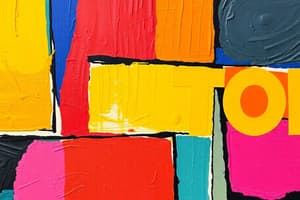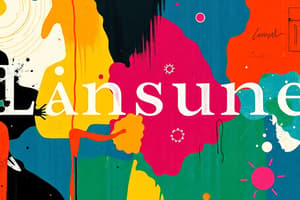Podcast
Questions and Answers
What does a hyperbole consist of?
What does a hyperbole consist of?
- An intentional exaggeration (correct)
- The repetition of consonant sounds
- A detailed comparison between two unrelated items
- A reference to a well-known cultural element
Which statement best defines an analogy?
Which statement best defines an analogy?
- The imitation of a sound through a word
- A humorous criticism of public figures
- A comparison that explains itself, often complex (correct)
- A statement that seems contradictory but holds truth
What type of figure of speech uses two opposite words together?
What type of figure of speech uses two opposite words together?
- Oxymoron (correct)
- Allusion
- Personification
- Metaphor
Which example best illustrates personification?
Which example best illustrates personification?
What does irony involve?
What does irony involve?
Which of the following is an example of alliteration?
Which of the following is an example of alliteration?
What does an allusion refer to?
What does an allusion refer to?
Which of the following examples represents a paradox?
Which of the following examples represents a paradox?
What is the purpose of using euphemism in language?
What is the purpose of using euphemism in language?
What does connotation refer to in language?
What does connotation refer to in language?
Which of the following best describes meiosis?
Which of the following best describes meiosis?
What is a key characteristic of antithesis in writing?
What is a key characteristic of antithesis in writing?
Which of the following best exemplifies sarcasm?
Which of the following best exemplifies sarcasm?
How is cacophony defined in rhetorical language?
How is cacophony defined in rhetorical language?
Which term refers to the repetition of consonant sounds?
Which term refers to the repetition of consonant sounds?
What does a rhetorical question aim to achieve?
What does a rhetorical question aim to achieve?
Which option correctly defines anaphora?
Which option correctly defines anaphora?
What is climax in rhetorical terms?
What is climax in rhetorical terms?
What does metaphorical synecdoche involve?
What does metaphorical synecdoche involve?
What is an epithet in rhetorical usage?
What is an epithet in rhetorical usage?
Which term describes using omission of conjunctions in a sentence?
Which term describes using omission of conjunctions in a sentence?
What is the function of metonymy in language?
What is the function of metonymy in language?
Flashcards
Simile
Simile
A comparison using "like" or "as" to show similarity.
Metaphor
Metaphor
A comparison that says one thing IS another, without "like" or "as".
Hyperbole
Hyperbole
Figurative language that uses exaggerated statements.
Alliteration
Alliteration
Signup and view all the flashcards
Onomatopoeia
Onomatopoeia
Signup and view all the flashcards
Satire
Satire
Signup and view all the flashcards
Paradox
Paradox
Signup and view all the flashcards
Personification
Personification
Signup and view all the flashcards
Euphemism
Euphemism
Signup and view all the flashcards
Connotation
Connotation
Signup and view all the flashcards
Meiosis
Meiosis
Signup and view all the flashcards
Apostrophe
Apostrophe
Signup and view all the flashcards
Antithesis
Antithesis
Signup and view all the flashcards
Sarcasm
Sarcasm
Signup and view all the flashcards
Consonance
Consonance
Signup and view all the flashcards
Rhetorical question
Rhetorical question
Signup and view all the flashcards
Epithet
Epithet
Signup and view all the flashcards
Anaphora
Anaphora
Signup and view all the flashcards
Climax
Climax
Signup and view all the flashcards
Cacophony
Cacophony
Signup and view all the flashcards
Assonance
Assonance
Signup and view all the flashcards
Pun
Pun
Signup and view all the flashcards
Parallelism
Parallelism
Signup and view all the flashcards
Study Notes
Rhetorical Devices
-
Metaphor: A figurative comparison where one thing is said to be another. Example: "He was a wolf among sheep."
-
Hyperbole: Intentional exaggeration. Example: "The plate exploded into a million pieces."
-
Alliteration: Repeating similar sounds at the start of words. Example: "She sells seashells by the sea shore."
-
Analogy: A comparison to explain something, using figurative language. It often explains itself, and metaphors and similes are considered types of analogies. Example: "Life is like a box of chocolates: you never know what you're going to get."
-
Onomatopoeia: Words that imitate sounds. Example: "The thunder boomed and the lightning crashed."
-
Allusion: A casual reference to a piece of popular culture. Example: "Finishing his memoir was his white whale."
-
Oxymoron: A figure of speech using contradictory words. Example: "The treaty led to a violent peace."
-
Satire: Using humor to criticize public figures. Example: "When Senator Jackson said 'numbers don't lie,' he forgot that his first name wasn't 'Numbers.'"
-
Paradox: A seemingly contradictory statement that makes sense. Example: "Youth is wasted on the young."
-
Simile: A comparison using "like" or "as." Example: "It was as hot as a desert this morning."
-
Irony: Using words to mean the opposite of their literal meaning. Example: Ashley said it was a beautiful day while drying off from the drenching rain.
-
Personification: Giving human qualities to non-human things. Example: "The beautiful valley spread its arms out and embraced us."
-
Anecdote: A short story about a personal experience, often funny or interesting. Example: "Five years ago, I went to the store and met some clowns."
-
Euphemism: A less direct way of saying something unpleasant. Example: "The baseball struck him in a sensitive area."
-
Connotation: Using words to suggest emotional or social meaning. Example: "This is a house, but I want a home."
-
Meiosis: Using euphemisms to minimize something's importance. Example: "We must put an end to this peculiar institution." ("Peculiar institution" is a euphemism for slavery.)
-
Apostrophe: Directly addressing an absent person, concept, or thing. Example: "You have made a fool out of me for the last time, washing machine!"
-
Antithesis: Using parallel structures to contrast ideas. Example: "No pain, no gain."
-
Sarcasm: Using irony to mock or show contempt. Example: "Oh, yeah, John is a great guy. A great guy who took the last slice of pizza."
-
Consonance: Repetition of consonant sounds. Example: "Mike likes Ike's bike."
-
Rhetorical Question: A question not meant to be answered. Example: "Can we really know what our place in the universe is?"
-
Epithet: A nickname or descriptive term. Example: "You need to listen to me and not Clueless Kevin over there."
-
Anaphora: Repeating words or phrases at the beginning of clauses. Example: "I came, I saw, I conquered."
-
Climax: Ordering words to build intensity. Example: "Look at the sky! It's a bird! A plane! Superman!"
-
Cacophony: Purposeful use of harsh sounds. Example: "The gnashing of teeth and screeching of bats kept me awake."
-
Assonance: Repetition of vowel sounds. Example: "She and Lee see the bees in the tree."
-
Pun: Humorously using words with multiple meanings or similar sounds. Example: "The farmer tried to get his cows to get along, but they insisted on having a beef with each other."
-
Parallelism: Using similar grammatical structures in sentences. Example: "Fool me once, shame on you. Fool me twice, shame on me."
-
Aphorism: A short, clever statement of truth or opinion. Example: "A penny saved is a penny earned."
-
Synecdoche: Using a part to represent the whole. Example: "The commander had an army of 10,000 swords."
-
Parody: Imitation for humor. Example: "If Edgar Allen Poe had written this speech..."
-
Colloquialism: Informal language or local expressions. Example: "Here in Philly, we love to eat hoagies and all kinds of tasty jawns."
-
Understatement: Intentionally lessening something's importance. Example: "The erupting volcano was a little problem for the neighboring city."
-
Syllogism: Deductive argument using generalizations. Example: "Dogs are mammals. Biscuit is a dog. Therefore, Biscuit is a mammal."
-
Eponym: Word/phrase based on a person's name. Example: "Reagonomics".
-
Metonymy: Replacing a name with something related to it. Example: "He loved music from the cradle to the grave."
-
Parenthesis: Interruption for clarity. Example: "The audience, or at least the paying members of the audience, enjoyed the show."
-
Expletive: Interrupting word/phrase for emphasis. Example: "The eggs were not, in any sense, delicious."
-
Metanoia: Self-correction (retracting or amplifying a statement). Example: "We’ll work on it on Sunday. No, let’s make that Monday —it’s the weekend after, all!"
-
Chiasmus: Reversing grammatical order in parallel phrases. Example: "Dog owners own dogs and cats own cat owners."
-
Asyndeton: Removing conjunctions from a sentence. Example: "Get in, cause a distraction, get out."
Studying That Suits You
Use AI to generate personalized quizzes and flashcards to suit your learning preferences.




